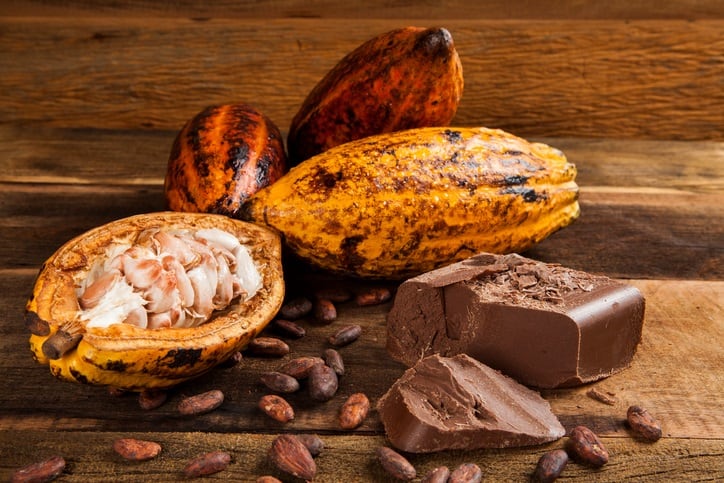For comfort-eaters who turn to fatty foods in times of anxiety, there may be a new (and delicious) way to curb the negative effects of their behaviour: a cup of cocoa.
In a recent study published in the Food and Function Journal, researchers at Birmingham University examined whether flavanols (compounds found in foods such as cocoa, green tea and red wine) when consumed alongside high fat foods can mitigate the negative impacts of both the stress and the unhealthy eating.
The aim was to show that fat consumption can impair the recovery of endothelial function (endothelial function refers to how well the endothelium, the thin layer of cells lining blood vessels, helps regulate blood flow, vascular tone, and overall cardiovascular health) following mental stress while flavanols consumed with fat can mitigate the negative impact.
The researchers wrote: “Stress is increasingly prevalent, with 17.1 million working days lost to work-related stress in the last year, and currently the most substantial increase in anxiety is being experienced by young adults (18–25-year-olds). Episodes of acute mental stress have been implicated as a trigger for myocardial infarction and sudden cardiac death. Acute mental stress can also trigger stroke.
Stress can temporarily affect how well blood vessels function, which may help explain its link to heart problems. For instance, people with stress-related heart issues often show reduced ability for blood vessels to widen and higher resistance in blood flow during stressful situations.
Stress can cause temporary changes in blood vessel function, such as a reduced ability of blood vessels to relax and increased resistance to blood flow. Even after a stressful event, these effects can last for 15 to 90 minutes and are linked to higher risks of heart and vascular diseases.
For example, reduced blood vessel flexibility (measured by a test called flow-mediated dilation or FMD) is associated with an increased likelihood of conditions like stroke or cardiovascular disease. Stress may affect vascular function by lowering nitric oxide levels—a molecule crucial for blood vessel health—due to the effects of stress hormones, inflammation, and oxidative damage.
Flavanol-rich dietary implications
During the study, the participants (23 young healthy people) ate a high-fat meal with high flavanol or low-flavanol cocoa an hour and a half before an eight-minute mental stress task.
The primary outcome, brachial flow-mediated dilatation (FMD), was assessed at pre-intervention baseline and 30- and 90-minutes post-stress. Pre-frontal cortical oxygenation was assessed post-meal at rest and during stress.
Forearm blood flow (FBF), blood pressure (BP), cardiovascular activity, common carotid artery (CCA) diameter and blood flow and mood were assessed before, during and/or after stress. FMD was impaired at 30- and 90-minutes post-stress after the low-flavanol cocoa.

The researchers said: “High-flavanol cocoa attenuated FMD impairments at 30 minutes and improved FMD at 90 minutes post-stress. Mental stress induced similar increases in cortical oxygenation, FBF, BP, cardiovascular activity, and disruptions to mood, in both conditions. CCA diameter increased and CCA retrograde blood flow decreased post-stress, with no difference between conditions.
“In summary, flavanols can counteract declines in endothelial function induced by consuming fat in the context of stress, but do not impact cerebral oxygenation. These findings can have important implications for flavanol-rich dietary choices to protect the vasculature from stress.”
Cocoa shows promise in stress response
A recent study highlights the potential benefits of cocoa flavanols in managing cardiovascular and stress-related responses. Conducted on healthy participants aged 19–35, this research explored how high- and low-flavanol cocoa meals (HFM + HFC vs. HFM + LFC) influenced flow-mediated dilation (FMD), cardiovascular measures, and mood ratings under stress conditions.
Key findings
Baseline Health: All participants exhibited similar baseline measures, such as heart rate, blood pressure, and brachial artery diameter, ensuring consistent starting points for comparisons.
Mood and Stress: Mood ratings were tracked across five-time points (baseline, rest, stress, and recovery). While differences were noted, no significant sex-based interaction effects emerged.
Cardiovascular Metrics: Analysis of FMD—a marker of vascular health—revealed a noticeable impact of flavanols post-stress. Advanced tools like near-infrared spectroscopy (NIRS) also detected flavanol effects on oxygenation during stress.
Robust Methodology: A mixed-effects model and repeated measures ANOVA ensured reliable data, even accommodating missing data due to technical issues. The study builds on previous evidence that flavanol-rich cocoa can enhance vascular function and cerebral blood flow, with potential implications for stress management and cardiovascular health.
Industry implications
With rising consumer interest in functional foods, cocoa-based products enriched with flavanols could see increased demand. These findings align with market trends emphasizing natural solutions for health and wellness.
Further research could cement cocoa flavanols' role in health-focused confectionery innovations, offering opportunities for producers to cater to both indulgence and wellbeing.
The research team concluded: “This study highlights that flavonoid-rich foods can temporarily protect endothelial function from the adverse effects of high-fat meals and stress in young, healthy adults.”
However, they said the same protective effects were not observed in the cerebral vasculature, likely due to a smaller flavanol effect in the brain and a need for larger sample sizes to confirm these findings. Given the predictive value of endothelial function for cardiovascular disease risk and the commonality of stress-induced high-fat food consumption, these results hold clinical importance. The doses used in the study are practical, equating to amounts found in everyday foods like green tea, cocoa, or berries, suggesting potential dietary strategies to support vascular health during stressful times.
Further details and methodology and findings can be found on the Royal Society of Chemistry’s Food & Function journal site.
The DOI for the study is 10.1039/D4FO03834G.





